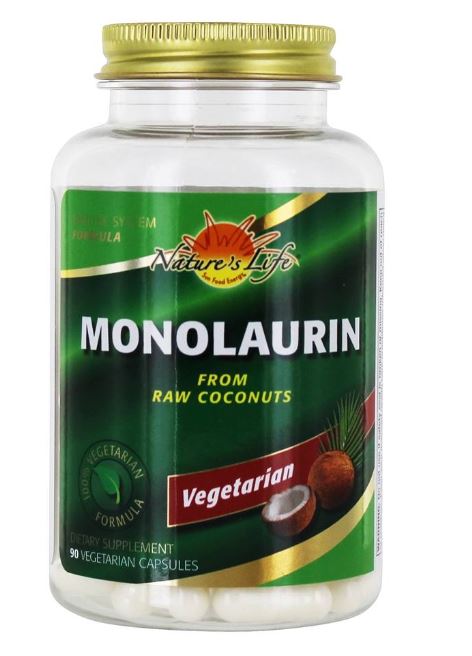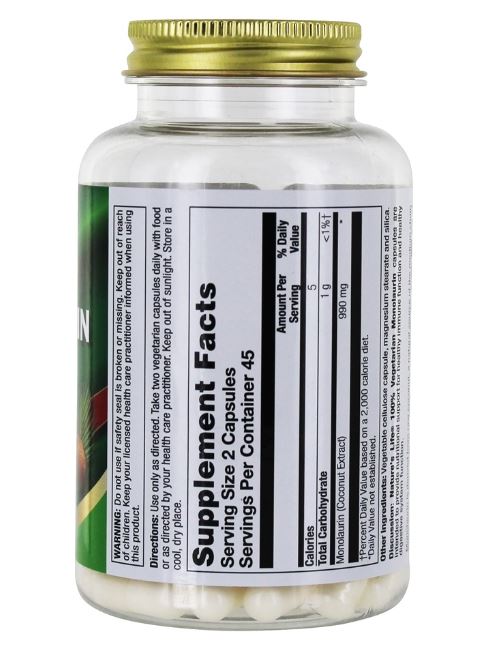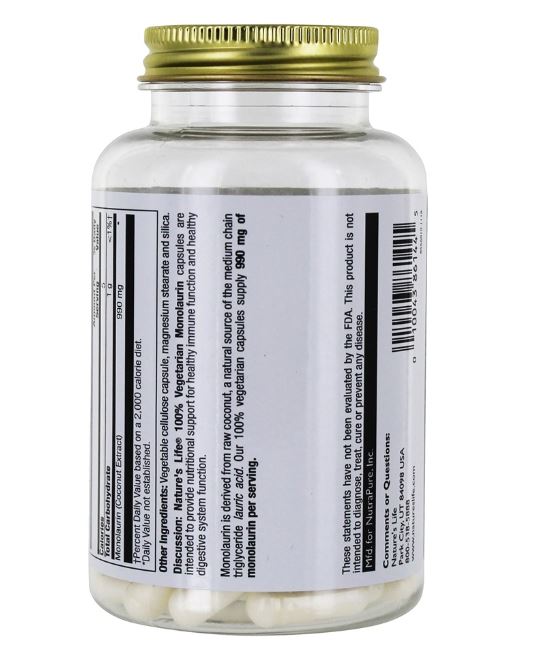Overview
Description
Nature's Life - Monolaurin 1100 mg. - 90 Vegetarian Capsules
Nature's Life 100% vegetarian monolaurin capsules are intended to provide nutritional support for healthy immune function and healthy digestive system function. Monolaurin is derived from raw coconut, a natural source of the medium chain triglyceride lauric acid. These 100% vegetarian capsules supply 990 mg of monolaurin per serving.
Monolaurin Benefits:
- Derived from Raw Coconuts
- 100% Vegetarian Formula
Monolaurin has also been packaged using the most environmentally-responsible materials available:
- Bottle: 100% post consumer recycled resin
- Label: 100% recycled paper
- Neck Tag: over 75% biodegradable polypropylene, tag portion is recyclable
- Cap: made of recyclable material
Frequently Asked Questions
Q. What are Essential Fatty Acids?
A. Essential Fatty Acids are "good" fats and we generally don't get enough of them... Essential Fats, or Essential Fatty Acids (EFAs) are essential nutrients that the human body can't produce itself. The only way humans can get these nutrients is through the diet. EFAs are polyunsaturated fats, which are considered "good" fats. EFAs contribute to the healthy functioning of cell membranes, and are also critical for the synthesis of eicosanoids, a family of hormone-like substances that help in cell maintenance on a minute-to-minute basis. Just like other essential vitamins and minerals, EFAs are necessary for the maintenance of good health. Research with EFA supplementation has shown promise in a number of areas including: rheumatoid arthritis, skin conditions such as eczema and psoriasis, high blood cholesterol, coronary heart disease, diabetic neuropathy, depression, high blood pressure, high blood triglycerides, and cancer.
Q. Which Fatty Acids are Essential?
A. Chemically speaking, there are two fatty acids that are truly "essential". These are Linoleic Acid (LA) and Alpha Linolenic Acid (ALA). The body cannot manufacture these fats itself, yet they are essential for health. A healthy body uses LA and ALA to produce other fatty acids, which, in turn, produce a host of beneficial compounds. These "subsidiary" fatty acids each play specific roles in the maintenance of good health and we generally include them when we talk about "Essential Fatty Acids": Gamma Linolenic Acid, Eicosapentaenoic Acid, and Docosahexaenoic Acid. There is one other "subsidiary fatty acid" that isn't always a good fat, but it, too, is necessary in small amounts: Arachidonic Acid.
Linoleic Acid (LA) LA is found in processed foods, margarine, and vegetable oils. LA helps improve skin conditions. It may also be partially converted to GLA in the body (see more on GLA below). The typical North American diet includes an excess of LA, so we do not need to worry about supplementation with this fatty acid.
Alpha Linolenic Acid (ALA) ALA is found primarily in Flax Oil and is also found in Black Currant Oil and Hemp Oil. The positive effects of ALA have been documented in areas including: high blood cholesterol, high blood pressure, immune system function, male infertility, and cancer. The body also converts a portion of ALA into two other fatty acids, EPA, and DHA. Gamma Linolenic Acid (GLA) A healthy body may derive some GLA from LA (see above). The richest natural source of GLA is Borage (also known as Starflower) Oil. GLA is also found in Black Currant, Evening Primrose and Hemp Oils. The body uses GLA to produce eicosanoids that are highly anti-inflammatory, dilate blood vessels, and reduce blood clotting. GLA is popularly used by women suffering from PMS. However, GLA has been clinically indicated to have therapeutic benefits in many other health conditions including: rheumatoid arthritis, cardiovascular disease, diabetic neuropathy, cancer, and skin diseases such as eczema skin dehydratation and psoriasis. The body definitely needs GLA and most North Americans are likely not getting enough of it.
Eicosapentaenoic Acid and Docosahexaenoic Acid (EPA and DHA) These two difficult-to-pronounce fatty acids are responsible for the beneficial effects of Fish Oils. EPA produces eicosanoids that have many beneficial effects on the body. Research demonstrates that Fish Oils containing EPA and DHA have therapeutic benefits in areas including: high blood triglycerides, high blood pressure, cardiac arrhythmia (irregular heart beat), infant brain development, ADHD, depression and cancer.
Arachidonic Acid (AA) AA is necessary for the infant brain development and small amounts are required for overall fetal development. However, it is not generally deemed a "good" fat, because, in excess, AA may have some harmful effects. AA is produced in the body from LA (see above). It is also found in meat, eggs, and some fish. The body uses AA to produce a class of eicosanoids that are strongly pro-inflammatory, constrict our blood vessels, and increase the possibility of blood clotting. These compounds are very useful when you accidentally cut your skin while peeling potatoes - without them you would bleed to death. But once you have an excessive amount of these eicosanoids, the blood can clot in places you don't really want it to - for example, arteries.
Q. What are "Omega-3" and "Omega-6" fatty acids?
A. "Omega-3" and "Omega-6" are scientific terms for two different families of EFAs - but the body needs a balance of each fatty acid regardless of the "family" it belongs to... "Omega-3" and "Omega-6" are scientific names for two different categories - or "families" - of essential fatty acids. These names are derived from the chemical composition of the fatty acid molecules. "Omega-3" fatty acids include Alpha Linolenic Acid (ALA), Eicosapentaenoic Acid (EPA) and Docosahexaenoic Acid (DHA). "Omega-6" fatty acids include Gamma Linolenic Acid (GLA), Linoleic Acid (LA), and Arachidonic Acid (AA). Although the terms "Omega-3" and "Omega-6" may be scientifically useful, they are not particularly useful for the average person. In truth, the body needs a balance of each fatty acid, regardless of the "family" it belongs to. For this reason, it may be easier to think not in terms of "families" but simply about the importance of each essential fat - like vitamins, the body needs all of them for good health.
Q. Why are essential fatty acids good for me?
A. Essential fatty acids are used by every cell in your body - and healthy cells make healthy people! EFAs control or modulate an amazing number of cellular processes. Essential fatty acids regulate a large number of mechanisms including increasing the fluidity of cell membranes and improving their "gate-keeping" abilities. These mechanisms help keep toxins out and bring nutrients into your cells. Essential fatty acids also influence the activation of cell genes, acting as second messengers and producing good eicosanoids. These hormone-like compounds help reduce inflammation in the body, help keep blood from clotting, and help keep your blood vessels dilated. Furthermore, a diet rich in EFAs can be helpful in many diseases (please see "Using EFAs in Medical Conditions").
Q. If I get lots of Linoleic Acid in the diet, and the body converts Linoleic Acid to GLA, why do I need to supplement with GLA?
A. Impairment of a critical enzyme... It is true that North Americans generally consume plenty of Linoleic Acid in processed foods, margarine, and vegetable oils. It is also true that the body should convert some Linoleic Acid to GLA, which, in turn, is used to produce beneficial eicosanoids. However, many people have difficulty using Linoleic Acid due to an impairment in a critical enzyme known as Delta-6-Desaturase, or "D6D". Without this enzyme, the body cannot convert LA into GLA, halting the production of beneficial eicosanoids. Many factors in our modern lifestyle affect the D6D enzyme... D6D function is impaired in many people partially due to the excessively high consumption of LA and partially due to other lifestyle factors such as smoking, alcohol consumption, stress, vitamin deficiencies, and high levels of saturated fat and trans-fatty acids in the diet. Some disease states, such as diabetes, are also associated with impaired D6D function.
Arachidonic Acid in the diet also affects our need for GLA supplementation. At the same time, the average North American is affected by excessive intake of Arachidonic Acid which, in excess, causes ill effects such as inflammation, blood clotting, and blood vessel constriction. The GLA solution...GLA does not require the potentially impaired D6D enzyme for breakdown by the body. The production of good eicosanoids from GLA will also counteract the ill effects of excess Arachidonic Acid. The average North American should therefore supplement the diet with a good source of GLA such as Borage Oil.
Q. What is "Borage Oil"?
A. Borage Oil is oil from the seed of the Borage plant, containing up to 24% GLA.... Borage, also known as Starflower, is a shrubby garden herb. The Borage plant has a long history of use in salads, soups, and drinks. It was also grown for the sake of its flowers, which yield excellent honey. According to Mrs. M. Grieve's "Modern Herbal", first published in 1931, cooks of the 19th century preserved the flowers and candied them. Today, the plant is grown as a commercial crop and harvested for the seed, which is nature's richest source of the fatty acid GLA. Oil produced from Borage seed contains between 20% and 24% GLA.
Q. What is "Evening Primrose Oil"?
A. Evening Primrose Oil is oil from the seed of the Evening Primrose plant, containing up to 10% GLA... The Evening Primrose is a plant commonly found in dry, open places, in fields and along roadsides. Chiefly a night bloomer, Evening Primrose opens so fast you can literally watch it bloom before your eyes. It has showy single flowers in pink, white or yellow and can reach 6 feet with blooms at the top. The pointed buds open at dusk, hence the name Evening Primrose. American Indians used Evening Primrose roots in tea for obesity and bowel pains, and in a pulp for piles, bruises, and on muscles to give strength. Today, Evening Primrose crops are grown commercially in many parts of the world. The oil is found in the Evening Primrose seed, which contains 8-10% GLA.
Q. What is the difference between Borage Oil and Evening Primrose Oil?
A. Borage Oil is much higher in potency since it contains more than twice as much GLA... Both Borage and Evening Primrose Oil contain the same active ingredient, GLA, which offers many benefits for the body. The big difference between the two is the concentration of GLA in Borage is more than twice as high - while Evening Primrose Oil typically contains between 8% and 10% GLA, Borage Oil contains between 20% and 24% GLA. Borage Oil offers more potency per capsule, which may allow you to take fewer capsules to achieve the same benefits - you may also take the same number of capsules and experience greater benefits! For example, if you are currently taking four 1,000 mg capsules of Evening Primrose Oil daily for rheumatoid arthritis, you may prefer to switch to Borage Oil and take only two 1,000 mg capsules daily - or you may switch to an equal number of Borage Oil capsules and potentially experience greater reduction in your symptoms.
Q. What is "Black Currant Oil"?
A. Black Currant Oil is oil made from the seed of black currants, containing both GLA and ALA.. The small, round, juicy berries of the Black Currant plant are familiar ingredients in herbal teas and jams. However, the tiny seeds inside the berries, are a rich source of essential fats. Oil produced from black currant seed contains 15-17% GLA and 10-12% ALA.
Q. What is "Flaxseed Oil"?
A. Flaxseed oil is oil gently pressed from flax seed, containing up to 60% ALA...
Flax seed has been used by various civilizations around the world for more than 10,000 years. In modern times, we are rediscovering its nutritional benefits. The oil of the seed is a rich source of Essential Fatty Acids, containing 50-60% ALA. Flax seed also contains other nutritional components including fiber and lignans. Flaxseed oil is prepared commercially in liquid form, in soft gel capsules or in vegetable capsules. The seed is also available whole or milled for use in breads, or for sprinkling on salads and cereals.
Q. What are "Fish Oils"?
A. Fish Oil is an oil prepared from the good fats in fish, containing both EPA and DHA... Many of us remember swallowing spoonfuls of cod-liver oil in the distant days of childhood. Well, our mothers were right - Fish Oil, containing the fatty acids EPA and DHA, is a valuable supplement to a healthy diet. Today, Fish Oil is prepared mainly from deep sea, cold water fish like sardines, anchovies, mackerel, salmon, cod liver and tuna.
Q. How should I supplement my diet with EFAs to make sure I'm getting enough?
A. Daily supplementation with a combination of Borage Oil, Flax Oil, and Fish Oil is the best way to make sure you get what you need...
Your body needs EFAs just like it needs other essential vitamins and minerals. The average person does get some EFAs through diet - but not enough to meet recommended daily amounts. Daily supplementation is the best way to ensure that you get the health-protecting benefits of EFAs. For the average person, supplementation with the following EFAs is required for the maintenance of good health:
- GLA: 500 mg daily - this amount is found in 2 grams of Borage Oil
- ALA: 500 to 1000 mg daily - this amount is found in 1-2 grams of Flax Oil
- EPA/DHA: 400 mg daily for both combined - this is found in 2 grams of Fish Oil daily.
A practical solution is to look for a blended oil product that combines a balance of these essential fats in one convenient capsule. People with specific disease conditions should follow the recommended dose for the individual fatty acids for a therapeutic effect (please see "EFAs in Medical Conditions"). Regular supplementation with these good fats is an important part of a balanced diet - that's why they call them "essential" fatty acids.
Suggested Use
Directions: Use only as directed. Take two vegetarian capsules daily with food or as directed by your health care practitioner. Keep out of sunlight. Store in a cool, dry place.
Ingredients
| Nature's Life - Monolaurin - 90 Vegetarian Capsules | |||||||||||||||||||||||||||||||||||||||
|
|||||||||||||||||||||||||||||||||||||||
| Other Ingredients: Vegetable cellulose capsule, magnesium stearate and silica. | |||||||||||||||||||||||||||||||||||||||
Warnings
Questions & Answers
2 Reviews
Needless to say, after a week or so I quit using. They need to be smoother and actually have the ability to dissolve.




















It works!
Recommended by a friend
trying a new brand of zinc lozenge
Good for colds etc..